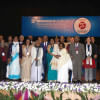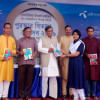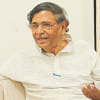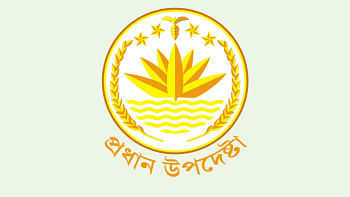Celebrating Abdullah Abu Sayeed, a pursuer of change

I knew that Abdullah Abu Sayeed was the founder of Bishwo Shahitto Kendro (BSK). But I didn't get the opportunity to know him personally as he taught at Dhaka College and I studied in a remote, suburban institute. Still, whenever I watched him speak on television, I was mesmerised. He was among a few select individuals in the country who spoke about eternal values and standards.
After graduating with an engineering degree during the 90s, I started working at the Power Division. Soon afterwards, I realised that I was not ready for a nine-to-five job. I had a single-track mindset; and I always believed my work should mean something. Motivated by that drive, I wrote to three renowned, visionary individuals – Dr Muhammad Yunus, Professor Dr Muhammed Zafar Iqbal, and Professor Abdullah Abu Sayeed – outlining my dream job in those letters.
Only Sayeed Sir responded. He invited me to meet him at the BSK in Dhaka. From then on, I saw him every evening, for two to three hours, for more than a month. Further motivated by him and his work, I quit my job and joined BSK as his deputy in mid-2000, where I worked till 2006. I must say, those were the best years of my life – as well as a transitional period. I tried to spend as much time as possible with Sayeed Sir at BSK, and discovered him to be a multifaceted personality.
***
I remember one day in particular. We were waiting for him to sign a letter, to be sent to a ministry. Eventually, he came in and we gave him the letter, which was printed on BSK's letterhead. The letter had to be sent to the ministry the next day, so everyone was in a rush. Sayeed Sir read the letter and made some corrections. We placed the corrections and gave him another printout, but he made some more corrections. He looked at the new draft and asked for it to be sent to his house, where he would take a look at it the next day.
We could not send the letter to the ministry the next day either. Even after repeated corrections, we could not get the final signature from Sayeed Sir. At one point, I got a bit annoyed and said, "Sir, if we take so much time to send one letter, we have to stop all other work." In reply, Sir raised his voice a bit and asked, "Whose signature will be on the letter, yours or mine?" I answered, "Yours." Sir replied, "Then it is necessary to be cautious. My image is at stake here. If a single word is wrong in this letter, everyone will laugh and say, 'This is the maker of enlightened individuals (alokito manusher karigor)!' My whole life's efforts will be tarnished within a moment!"
I became dumbfounded. Sir noticed my reaction and signed the letter. Lowering his voice, he said, "Look, it's about perfection. I know I am nobody. But look at Rabindranath's manuscripts, and you will know what perfection is. He used to make so many corrections in a single write-up!"
This is how concerned Sayeed Sir is about his and BSK's reputation, which is why he has always been cautious about his work, especially that which is linked with the BSK.
***
Sayeed Sir has been deeply interested in the environmental movement. New initiatives and innovations make him more active. In the past, when he got involved with the environmental movement, it caught the government's attention, especially due to the media coverage of his involvement. He was outspoken against river-grabbing and river pollution. He started speaking about these issues on TV regularly and wrote articles for newspapers and journals. For the first time, it seemed that a civil society movement was being formed, and it also garnered respect from the media. At that time, the government established a high-powered committee to eliminate river-grabbing around Dhaka, and to create a circular riverine way.
As civil society representatives, Professor Sayeed was included in the committee, along with Professor Muzaffar Ahmed and Professor Serajul Islam Chowdhury. The BNP was in power then. The committee members included powerful ministers such as Mirza Abbas, Sadeque Hossain Khoka, Lt Col (retd) Akbar Hossain, etc. The committee met occasionally, but Professor Muzaffar Ahmed would never join them, because he thought that such committees would eventually not be fruitful. Professor Serajul Islam Chowdhury would sometimes attend the meetings. The only exception was Sayeed Sir. He had a lot of enthusiasm and he really hoped for a positive change. Sir used to tell us, "A state is a behemoth. You have to continuously push it for the sake of the people. It is the civil society's duty to do so."
Once, he entered the meeting a bit later than the stipulated time. Mirza Abbas remarked, "The civil society makes such noise, but no one other than Sayeed Shaheb attends the meetings." Sir replied with a smile, "Civil society is like a Royal Bengal Tiger. One member is good enough." His witty comment led to roars of laughter.
On another occasion, during an important government meeting, someone commented that Sayeed Shaheb had worked with the previous regime, too. Sir paused for a while, then replied with a smile, "See, BSK gets nominal help from the government. Thus, I have to participate in meetings and work with whoever forms the government. Can I be blamed for your inability to come to power? Previously, you failed to form the government, and now why are you shifting the blame on me?" As usual, the meeting ended with a lot of laughter.
***
I have many such experiences and anecdotes regarding Sayeed Sir. Before knowing him, I did not know that one could work with so much love for life, with the dream of awakening the hearts of people. Sayeed Sir continues a most difficult act of making people habituated with reading books, and keeping that initiative alive and running year after year through new ideas, with an almost meditative attention, for which we should praise him. I believe there are very few individuals in our country who can match Sayeed Sir's tolerance level and his ability to accept criticism with a smiling face. He is an exceptional human being with a childlike simplicity, and a great love for mankind in his heart.
On July 25, Sayeed Sir's birthday, I bestow my humble respect and love towards him. His work, words, writings, resilience, colourful efforts – all these will continue to inspire Bangladesh's youth through different ways and means, for generations to come. Happy birthday, sir! Congratulations, and best wishes to you.
Translated from Bangla by Mohammed Ishtiaque Khan.
Shuvo Kibria is a senior journalist and former coordinator of Bishwo Shahitto Kendro.

 For all latest news, follow The Daily Star's Google News channel.
For all latest news, follow The Daily Star's Google News channel. 







Comments